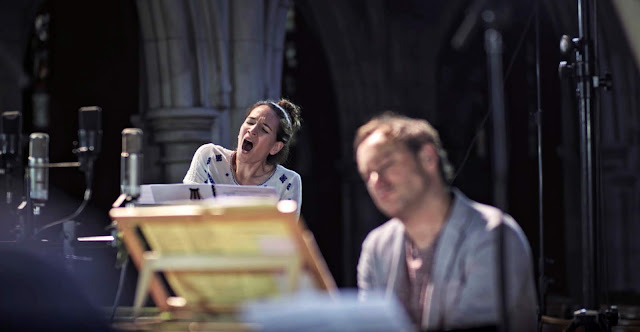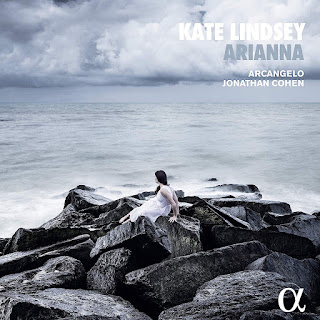Arianna - Scarlatti, Handel, Haydn; Kate Lindsey, Arcangelo, Jonathan Cohen; Alpha Classics
Reviewed by Robert Hugill on 29 January 2020 Star rating: (★★★★)
Three cantatas from the Baroque and Classical periods bring the story of the abandoned Ariadne vividly to life
The myth of Ariadne has long fascinated musicians from Monteverdi's lost opera through to the modern day [both Alexander Goehr and Thea Musgrave have produced operas inspired by the story], and specifically it seems to be not the love-struck woman who helps Theseus defeat the Minotaur, but the later Ariadne the one abandoned on Naxos by Theseus and left lamenting her lost love.
On this disc from Alpha Classics, mezzo-soprano Kate Lindsey joins Jonathan Cohen and Arcangelo for three cantatas with Ariadne at their centre, Alessandro Scarlatti's L'Arianna (Ebra d'amor fuggia) H.242, George Frideric Handel's Ah crudel, nel piano mio, HWV 78, and Franz Joseph Haydn's Arianna a Naxos, Hob. XVIb:2 in an orchestration by his pupil, Sigismund Neukomm. Interestingly, Kate Lindsey's UK operatic debut was as the Composer in another musical version of the story, Richard Strauss' Ariadne auf Naxos.
Reviewed by Robert Hugill on 29 January 2020 Star rating: (★★★★)
Three cantatas from the Baroque and Classical periods bring the story of the abandoned Ariadne vividly to life
The myth of Ariadne has long fascinated musicians from Monteverdi's lost opera through to the modern day [both Alexander Goehr and Thea Musgrave have produced operas inspired by the story], and specifically it seems to be not the love-struck woman who helps Theseus defeat the Minotaur, but the later Ariadne the one abandoned on Naxos by Theseus and left lamenting her lost love.
On this disc from Alpha Classics, mezzo-soprano Kate Lindsey joins Jonathan Cohen and Arcangelo for three cantatas with Ariadne at their centre, Alessandro Scarlatti's L'Arianna (Ebra d'amor fuggia) H.242, George Frideric Handel's Ah crudel, nel piano mio, HWV 78, and Franz Joseph Haydn's Arianna a Naxos, Hob. XVIb:2 in an orchestration by his pupil, Sigismund Neukomm. Interestingly, Kate Lindsey's UK operatic debut was as the Composer in another musical version of the story, Richard Strauss' Ariadne auf Naxos.
The cantata was a popular form in the 18th century, it enabled both composer and soloist to show off their operatic prowess in a genre which was highly portable (just a singer and a few instruments, often lasting around 15 minutes). In fact, Handel mined his Italian cantatas for his operas so music from the first aria in the Arianna cantata made its way into Agrippina.
Both the Scarlatti and the Handel cantatas on this disc were probably written in Rome in 1707 for the Arcadian Academy (described by James Halliday in his booklet essay as a kind of intellectual gentleman's club), though to our eyes the subject-matter might seem some way from the pastoral idyll the academy aimed it. Ariadne lamenting her abandonment on Naxos is a woman in extremis, which seems to be something that the early 18th century gentlemen liked hearing about, a number of other Handel cantatas involve women in similar extreme situations. From the composer's point of view, such a subject however gave the opportunity to display a wide range of emotions over a short period.
 |
| Kate Lindsey, Jonathan Cohen (Photo - film still, Olly Lambert) |
Though Handel takes his heroine through a very similar sequence of emotions, he does not give her an apotheosis, suggesting the alternative story where she commits suicide. If Alessandro Scarlatti's was quite an intimate piece, despite the use of instrumental forces, Handel's feels larger scale with the young composer (22 at the time) flexing his operatic credentials.
The substantial instrumental sonata which starts Handel's cantata is in the standard fast, slow, fast sequence, a perky outer movement contrasting with a poignant central section with fine oboe playing. In fact, this is playing that really grabs our attention and makes us want to listen more. Both Cohen and Lindsey treat Arianna dramatically, giving us a quasi-operatic experience albeit on a smaller scale. The powerful opening aria (the one re-used for Agrippina) is sombre yet Lindsey is highly expressive, and this continues in the recitative leading to the second aria, upbeat and quite forthright. Lindsey is not a Baroque specialist, and her way with the more ornamental passages can be quite individual but I certainly liked it here. The recitative where Ariadne realises what has happened vividly covers the gamut of emotions, leading to a final rather life-affirming aria with more fine oboe playing.
Haydn's Ariadne cantata was written in 1789/90 for voice and piano, the vocal part has relatively limited compass and is not too taxing, making commentators think that it may have been intended for a non-professional performer. But in 1791, Haydn performed it in London with some success with one of the great castrati of the day as Ariadne! He had written to his publisher in 1790 about wanting to orchestrate the work, but never did so. Various orchestrations exist, but the one by Sigismund Neukomm is important because Neukomm was Haydn's pupil from 1797 to 1804 and in 1808, when Neukomm orchestrated the work, Haydn was still active and the two were in contact so Haydn is almost certain to have known about the orchestration. An interesting point is the way Neukomm uses clarinets at the forefront rather than the traditional oboes, and there is a forte piano continuo but this is in fact very discreet and embedded in the orchestral texture; all the recitatives become accompanied ones.
The result is highly engaging, and I am puzzled as to why it is not better known. Neukomm brings a brilliant range of colours to the piece, and the combination of orchestration with clarinets and Haydn's vocal writing makes some of the arias very Mozartian. It is, of course, on a larger scale than Haydn's original with voice and piano, and Lindsey gives the piece quite an operatic feel, the expression ranges widely from the hushed intensity of the opening, to the vivid vigour of the final aria. The first aria is very neo-classical in shape and scale but also highly expressive, whilst the key recitative is full of vivid drama. The final aria moves from classical poise to something more vivid, with Lindsey again spitting out the consonants.
By the time that Haydn came to write his cantata the form was, perhaps, slightly old-fashioned. The network of patronage and salon performance which had sustained the form was changing and both Mozart and Beethoven wrote concert arias rather than cantatas. This fascinating disc takes us very much across the 18th century, showing how different composers reacted to the story of the abandoned Ariadne. Kate Lindsey, Jonathan Cohen and Arcangelo bring each cantata vividly alive, showing how differently Scarlatti, Handel and Haydn reacted, yet each creating a dramatic microcosm.
Alessandro Scarlatti (1660-1725) - L'Arianna (Ebra d'amor fuggia) H.242
George Frideric Handel (1685-1759) - Ah! crudel, nel piano mio, HW 78
Franz Joseph Haydn (1732-1809) - Arianna a Naxos, Hob. XXVIb:2
Kate Lindsey (mezzo-soprano)
Arcangelo
Jonathan Cohen (conductor, harpsichord, chamber organ)
Recorded in August 2019 at St Augustine's Church, London
ALPHA CLASSICS ALPHA 576 1CD [72.13]
Available from Amazon.
Elsewhere on this blog
- An evening with Rosina Storchio: Ermonela Jaho's Wigmore Hall debut celebrates Opera Rara's 50th anniversary (★★★★) - concert review
- Music conceived of through restriction, which paradoxically gives the composer freedom: I chat to composer & Royal Academy of Music lecturer Alex Hills - Interview
- A touch of heaven: The Divine Muse, Mary Bevan & Joseph Middleton in Wolf, Schubert & Haydn (★★★★) - concert review
- A welcome chance to hear the Orchestra National de Lille under its music director Alexandre Bloch in London, in Ravel, Debussy and Beethoven (★★★★) - concert review
- From Georgia to Lotus Land: pianist Nino Gvetadze in music by Cyril Scott (★★★½) - CD review
- Genesis: accordionist Bartosz Glowacki's fine debut recording moves from Scarlatti & Rameau to Trojan, Gubaidulina, Vlasov, Pärt & Piazzolla (★★★★) - CD review
- Superb ensemble showcase: Opera North's new production of Kurt Weill's Street Scene (★★★★½) - opera review
- Audience development and evangelism at the core of what they do: I chat to Adam Szabo of the Manchester Collective - interview
- Maxim Vengerov: celebrating 40 years since his stage debut with new recordings & a new relationship with IDAGIO - interview
- Beethoven Odyssey: Daniel Barenboim completes his sonata performances at the Philharmonie in Paris (★★★★★) - concert review
- Beethoven marathon: François-Frédéric Guy directs all the piano concertos from the keyboard in one concert in Paris (★★★★★) - concert review
- A flaming affair: Berlioz' La damnation de Faust at the Philharmonie de Paris -
(★★★★★) concert review - Home












No comments:
Post a Comment